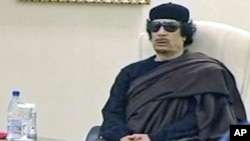Ousted Libyan leader Moammar Gadhafi is urging his remaining supporters to rise up against the new powers in Libya, whom he dismisses as spies and mercenaries.
Gadhafi kept up his defiance Thursday, saying he remains in Libya and that "millions" of his countrymen are showing their support for him by marching in the streets.
He maintained that the youth in Tripoli and "everywhere" are ready to carry out attacks against the "rats" and "germs" who he said are in the pay of NATO.
Gadhafi, not seen in public in months, has been on the run since forces loyal to the National Transitional Council captured Tripoli more than two weeks ago and now control an estimated 80 percent of the country.
In the audio message, aired on a Syrian station Thursday, Gadhafi downplayed reports that a convoy, thought to carry some of his loyalists and possibly gold and cash, had gone to Niger earlier in the week.
Forces supporting Gadhafi still control three main towns - Sirte, Bani Walid and Sabha. The NTC says its forces surround all three, and has given leaders until Saturday to surrender. Negotiations have been going on for days, but have hit numerous snags.
In Tripoli, the head of the NTC executive committee, Mahmoud Jibril was set to give his first news conference in the capital later Thursday. Informally called the provisional prime minister, Jibril has faced criticism for taking so long to arrive.
Jibril and NTC leader Mustafa Abdel Jalil, who has yet to come to Tripoli, have been drumming up support abroad. Officials say there are logistical difficulties in moving to the capital.
But the slow move from NTC headquarters in Benghazi, plus suggestions by officials that part of the government may stay there, have raised concerns about a possible power vacuum in the capital.
NTC media spokesman Jalal al Galal says some degree of decentralization is important, given the damage and inefficiencies of the tight control Gadhafi wielded in Tripoli - but only up to a point.
"I think the proposal of having half the government here and half the government in Benghazi is not practical," he said. "I think each sector of the government or each department must have a high level of representation in Benghazi that is, to some extent in coordination with the government here, autonomous to act, to proceed with issues on the ground in the eastern section of the country."
It's just one more issue for the NTC to sort out, as it struggles to re-order everything from elections, to a police force to garbage collection.




